07 December 2022
16 min read
Published by:

With the Fair Work Legislation Amendment (Secure Jobs, Better Pay) Act 2022 (Amending Act) commencing on 7 December 2022, substantial amendments will have been made to the Fair Work Act 2009 (Cth) (FW Act).
In the third part of this series, we look at the provisions regarding bargaining, enterprise agreements and industrial action, and the impact on industrial relations strategies. You can revisit part one which looks at fixed term contracts and flexible work, and part two on pay secrecy and job advertisements.
Policy: The Federal Government considers the decline in coverage of enterprise agreements over recent decades is in part due to an overly restrictive framework for making enterprise agreements under the FW Act. By expanding options to make multi-employer enterprise agreements, the Federal Government anticipates that the decline in collective bargaining will be reversed, and the positive outcomes that accompany an effective collective bargaining system, such as an increase in productivity and real wages, will be achieved. In addition, new streams of bargaining will increase the capacity for low-paid and female-dominated sectors to access the benefits of enterprise bargaining.
Operative provisions – single interest bargaining stream:
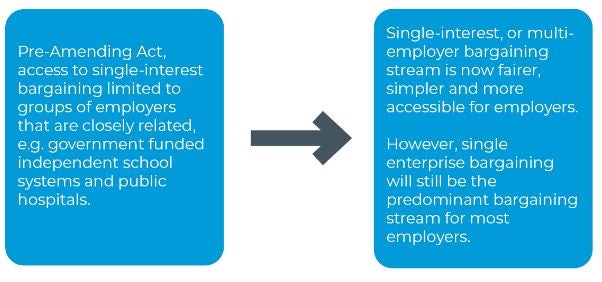
The FWC may make a single interest employer authorisation on application by an employer or union. They may also grant the authorisation without the employer’s consent, therefore compelling the employer to bargain with other employers (other than small business employers or those covered by an enterprise agreement still within its nominal life) if:
Where the employers are common interest employers, the FWC must be also satisfied that the operations and business activities of the new employer are reasonably comparable with the other employers under the agreement. In determining whether the employers have clearly identifiable common interests, the following features will be relevant:
However, the FWC has the discretion to decide that the employers are not reasonably comparable once they ascertain the full scope of their business activities and operations, despite having similar features initially.
While covered by the single interest employer authorisation, the employer will be prohibited from bargaining with employees for any other agreement. The Amending Act has also given power to the FWC to exclude employers from the terms of the single interest employer authorisation, if it is satisfied that:
When it comes to an application to add a new employer to a multi-employer agreement or authorisation, the FWC now has a discretion to refuse that application if satisfied that less than nine months has passed since the nominal expiry date of an agreement that covered the employer and relevant employee.
The Amending Act also provides a new capacity for the FWC to issue an order requiring a multi-employer agreement to be put to a vote of employees regardless of whether all employee organisations agree, if one or more employee organisations are unreasonably withholding agreement.
The civil construction sector is exempt from the above and all other streams of multi-enterprise bargaining.
Operative provisions – low-paid bargaining stream:

The FWC is now empowered to order that certain employers and employees will be covered by a proposed supported bargaining agreement without having to be satisfied of the general requirements for entry into the supported bargaining stream (i.e. the appropriateness for the relevant employees to bargain together, having regard to pay and conditions in the relevant industry, including whether low rates of pay prevail, whether the employers have common interests and where at least some of the employees are represented by a union). The FWC will not approve the variation if satisfied that there are serious public interest grounds for not approving it.
Supported bargaining agreements prevail over any single-enterprise agreement that would otherwise apply to the employee, even when the agreement has not passed its nominal expiry date. Employers can opt into the supported bargaining agreement if a majority of employees support it. Unions may also apply for a supported bargaining agreement to cover workplaces where a majority of employees want to be covered (without the employer’s consent), provided employees are not covered by another agreement that is still within its nominal life.
Operative provisions – cooperative workplaces stream:
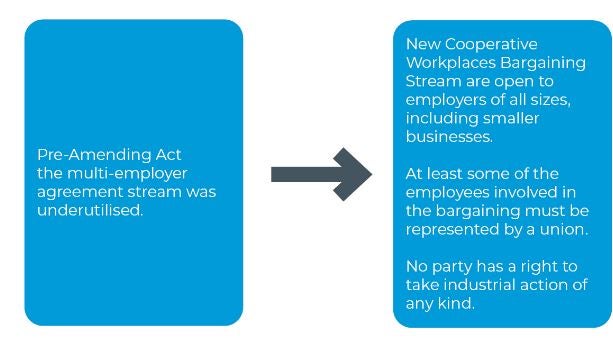
Implications for your organisation: Little will change if your organisation has a history of making single-enterprise collective agreements under the FW Act with union bargaining representatives. The prospect of being ‘roped-in’ to bargaining for a multi-employer agreement will be minimal if you engage with union bargaining representatives about a replacement agreement when your current agreement passes its nominal expiry date. This is one of many features of the Amending Act designed to prod employers to conclude an enterprise agreement.
However, if you are a small business or a government-funded organisation, you will have the opportunity to pursue a collective agreement through the new streams of bargaining that are designed to support employers who have not had the capacity to engage in the process in the past.
The changes to the single interest bargaining stream, low-paid bargaining stream cooperative workplaces stream will come into effect on 6 June 2023 (or an earlier date to be fixed by proclamation).
Policy: Prior to the Amending Act, requirements to initiate enterprise bargaining were said to be unnecessarily complex and have contributed to the decline in enterprise bargaining. A recalcitrant employer could only be required to bargain if a majority support determination (MSD) was made, which was difficult to obtain. The requirements for making a genuine agreement and meeting the better off overall test (BOOT) were seen to be onerous and unnecessarily prescriptive.
Operative provisions:
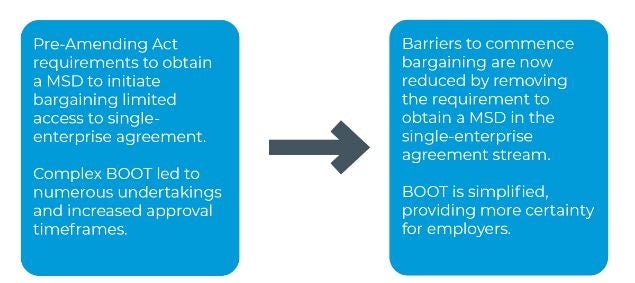
A union bargaining representative can initiate bargaining by simply making a written request to the employer when employees are covered by an agreement that has passed its nominal expiry date within the last five years, and the scope of the proposed agreement is substantially similar to the expired agreement.
This process of initiating bargaining will not apply to a proposed Greenfields agreement, a cooperative workplaces agreement, a supported bargaining agreement or a single-enterprise agreement in relation to which a single interest authorisation is in operation.
When considering whether a proposed enterprise agreement meets the BOOT, the FWC will:
When applying the BOOT, the FWC will be required to consider ‘reasonably foreseeable employees’. The Amending Act defines ‘reasonably foreseeable employee’ as a person who, if they were an employee of an employer covered by the agreement at the ‘test time’, would be covered by the agreement and the relevant modern award. In deciding this, the FWC must only have regard to patterns or kinds of work, or types of employment which are reasonably foreseeable at the ‘test time’. The FWC will no longer be required to consider hypothetical working arrangements that are not reasonably foreseeable.
This new definition of ‘reasonably foreseeable employees’ also affects the reconsideration process. The fact that ‘new employees’ with different terms and conditions come under the agreement and carry out the same work as the ‘original employees’ will not warrant reconsideration, because the BOOT would have been applied to all ‘reasonably foreseeable employees’ in the first instance.
Reconsiderations mean that if the FWC decides that the enterprise agreement does not pass the BOOT upon reconsideration, it must amend the agreement retrospectively where it considers necessary to do so. The FWC has discretion as to the operative date for these amendments to the agreement. During the reconsideration process, an employer may provide an undertaking to undertake reconciliations and back payments if required, or to amend the agreement.
The FWC has given discretion to work with the parties during the approval process in a constructive manner, to consider specific objections and to vary or excise terms that do not otherwise meet the BOOT. The aim of this amendment is to limit undertakings (which can make it harder for workers and managers to interpret the document, and lead to future legal disputes if it is poorly drafted) and delays in the commencement of an agreement.
The changes in relation to initiating bargaining came into effect on 7 December 2022. However, the amendments to the BOOT will not come into effect until 6 June 2023 (or an earlier date to be fixed by proclamation), and will then apply to any enterprise agreement ‘made’ (i.e. voted up by employees) on or after commencement.
Implications for your organisation: The relaxation of the BOOT will make the approval process for enterprise agreements less onerous. However, the avenue to have settled agreements revisited during their life is somewhat concerning, given the key reason to make the agreement is to achieve certainty for pay and conditions.
If your organisation has a history of making enterprise agreements with union bargaining representatives, you will need to engage in more preparation in the final weeks or months before the nominal expiry date passes, given the ease by which bargaining for a replacement can be triggered. You will no longer be able to force the union to test the support for bargaining amongst employees through the MSD process.
Policy: The Federal Government perceives that there are insufficient mechanisms under the current FW Act framework to resolve intractable industrial disputes. Employers can engage in prolonged ‘surface’ bargaining that does not lead to the conclusion of the bargaining process.
Prior to the Amending Act, access to arbitration to overcome a bargaining dispute is quite restrictive. The FWC has powers to arbitrate a dispute without the consent of all parties only in circumstances where industrial action has been terminated by the FWC; where bargaining is intractable under the low-paid bargaining stream; or after a “serious breach declaration” had been made. The bar to obtain such a declaration was extremely high. Therefore, when negotiations were at a deadlock, or in cases of protracted bargaining, there was no option for the parties but to take industrial action, which was likely to harm the relationship between businesses and employees.
Operative provisions:
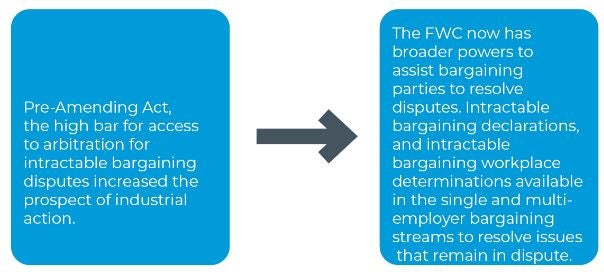
The Amending Act broadens the FWC’s arbitration jurisdiction to assist parties bargaining for a new enterprise agreement to resolve disputes.
The concepts of ‘serious breach declarations’ and ‘bargaining-related workplace determinations’, are removed ,and the FWC can make ‘intractable bargaining declarations’ and ‘intractable bargaining workplace determinations’ to resolve bargaining issues that remain in dispute. These are available in the single and multi-employer bargaining streams (a supported bargaining authorisation or a single interest employer authorisation is in operation), but not in relation to the cooperative workplaces stream or Greenfields agreements.
A bargaining representative is not be able to seek an intractable bargaining declaration until at least nine months have passed since the most recent nominal expiry date of the existing agreement or nine months from the commencement of bargaining, whichever is later. Where a bargaining representative for a proposed agreement seeks an intractable bargaining declaration, the FWC must first seek to resolve the dispute through its powers, including conciliation. It will only make a declaration when it concludes that there is no reasonable prospect of an agreement being reached by other means and (after taking into account the view of the employer, union and other employee bargaining representatives) is reasonable in all circumstances.
After issuing a declaration, the FWC may provide the parties with a further opportunity to negotiate. Following any post-declaration negotiation period, the FWC will make an intractable bargaining workplace determination to resolve any matters that remain at issue between the parties.
The changes in relation to bargaining disputes will come into effect on 6 June 2023 (or an earlier date to be fixed by proclamation).
Implications for your organisation: Employers will need to carefully consider their bargaining strategy in light of the expanded avenues for the FWC to apply pressure on industrial parties to make concessions in order to reach an agreement. An employer may well consider at the outset of bargaining that an industrial issue is most unlikely to be resolved by agreement, in which case it will need to consider how it will convince the FWC not to impose the unwanted outcome by arbitration.
Policy: The pre-Amending Act process for taking protected industrial action was highly prescriptive. To encourage more employers and employees to engage in enterprise bargaining, the Amending Act has made amendments to ensure the process for taking industrial action during bargaining negotiations is “robust and fair”.
Operative provisions:
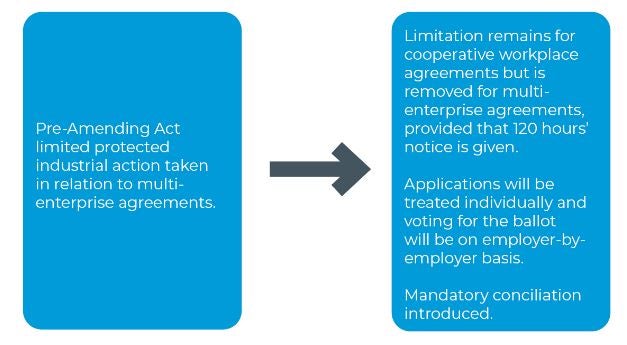
The Amending Act makes the following changes to industrial action during enterprise bargaining:
Implications for your organisation: The requirement for the FWC to conduct a conciliation conference at the first step of a process leading to protected industrial action, together with the lengthened notice period for taking industrial action, should reduce the prospect of industrial action being taken and encourage employers and employees to try and reach an agreement.
Employers should consider these proposed changes to industrial action as part of their enterprise bargaining strategy. The changes are intended to disincentivise employees to take immediate industrial action if there are bargaining disputes.
The changes concerning industrial action will come into effect on 6 June 2023 (or an earlier date to be fixed by proclamation).
Termination of enterprise agreements after nominal expiry date
Policy: The Federal Government seeks to reduce the capacity of employers seeking to apply industrial pressure on employees during bargaining through the unilateral termination of the existing expired enterprise agreement. Currently, where an enterprise agreement has passed its nominal expiry date, it generally remains in place until it is either replaced or terminated. A party (employer, employee, or union) can apply, without the other party’s consent, to terminate a nominally expired but operational agreement. This, in practice, results in some employers threatening to terminate an existing nominally expired agreement due to deadlocked bargaining negotiations. Employees then face pressure to accept less favourable pay and conditions or risk having their wages governed by modern awards.
Operative provisions:

In dealing with an application to terminate an enterprise agreement that has passed its nominal expiry date, the FWC must be satisfied that:
The FWC must also consider the views of affected parties and any other relevant matter, including whether bargaining for a proposed replacement agreement is occurring and whether the termination would adversely affect the employees’ bargaining position.
In addition to the above requirements, the FWC must terminate the enterprise agreement only if it is appropriate in all the circumstances to do so. If the agreement still covers employees and any party opposes the termination, then the matter must be heard by a Full Bench of the FWC.
Agreements will continue to be able to be terminated or varied by consent at any time (including before their expiry).
Implications for your organisation: The changes remove the unilateral termination of expired enterprise agreements, a tactic for an employer’s bargaining strategy. A party may still be able to apply to the FWC to unilaterally terminate an agreement, but only in exceptional circumstances as outlined above. It is now more difficult (although not impossible) to terminate expired enterprise agreements during enterprise bargaining. Employers should bear this in mind during the planning stage of the bargaining process.
Farewell ‘zombie’ agreements
Policy: The Amending Act automatically terminates agreement-related instruments made before the commencement of the FW Act and during the bridging period (1 July-31 December 2009). These agreements are generally known as ‘zombie’ agreements and include both individual and collective agreements. Zombie agreements were not required to be compared against modern awards when they were made and often contain terms and conditions that are less beneficial to employees than those under the modern award system. Pre-Amending Act, zombie agreements continued to operate unless they were terminated or replaced.
Operative provisions:

The Amending Act provides that zombie agreements automatically terminate on 6 December 2023, unless that period is extended following an application to the FWC. Employers, employees or industrial associations covered by the zombie agreement may apply for an extension up to four years before the sunset date. The extension will only be granted if certain conditions are met, including that employees are better off.
Employers covered by a zombie agreement are required to notify affected employees of the sunsetting arrangement within six months of the commencement of the legislation.
Implications for your organisation: Employers will need to identify whether they are covered by these relics of the WorkChoices laws and determine whether they need to apply for an extension. At the end of the sunset period, employees’ pay and conditions will be set by the relevant modern award or a new enterprise agreement that has been assessed against a modern award.
If you have any questions or need assistance with reviewing your enterprise agreements, please get in touch with partner Charles Power or a member of our national Workplace Relations & Safety team in the Key Contacts section below.
Authors: Charles Power & Fiorella Chiavetta
Disclaimer
The information in this article is of a general nature and is not intended to address the circumstances of any particular individual or entity. Although we endeavour to provide accurate and timely information, we do not guarantee that the information in this article is accurate at the date it is received or that it will continue to be accurate in the future.
Published by: